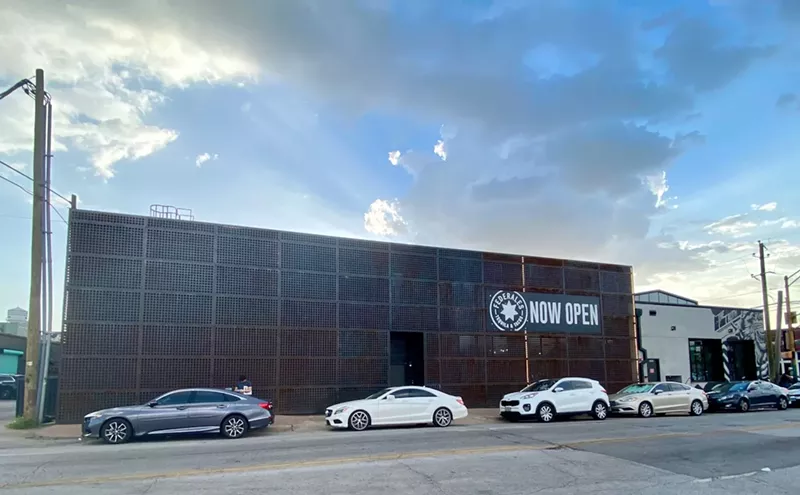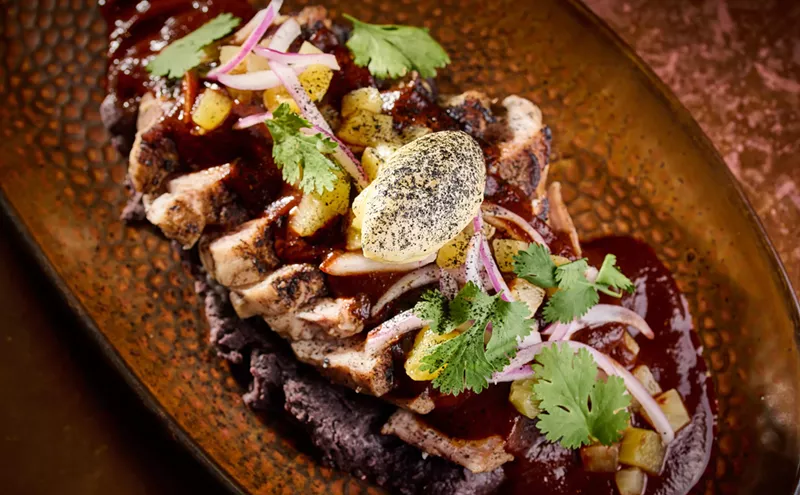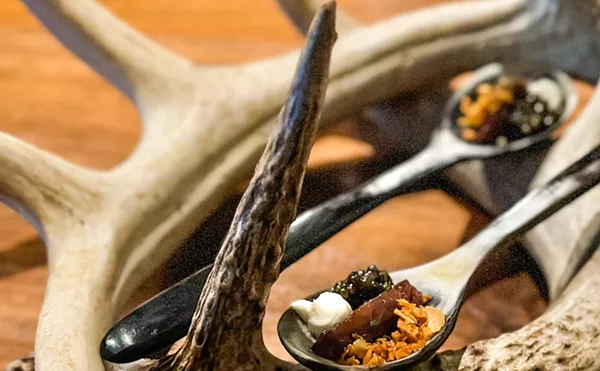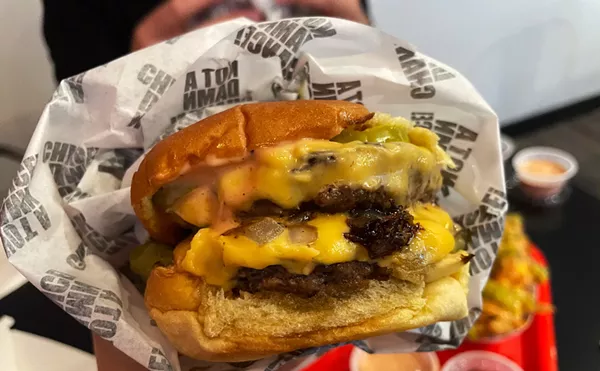It's a one-time deal for the Knox-Henderson-area establishment: break the law, do it quickly and get away scot-free. Their fiendish plot involves a happy hour for Dallas dog owners, a gathering of people and their pets on the restaurant's patio with food and drinks and doggie treats for all. The $15 cover charge goes to charity.
OK, so as criminal activity goes, this isn't the Brink's Job. But according to Chauncy Williams of the Dallas health department, city ordinances ban animals from retail establishments and food-service areas--police dogs, guide dogs and edible fish excepted, of course. Well, perhaps in certain places, dogs would fit the edible category, but...
Increasingly throughout the Dallas area, restaurants with patios cater to dog owners. Paris Vendome boasts of its pet-friendly station. "From three to six dogs will be on the patio on an average night," claims Paris Vendome's George Majdalani. "The dogs are primped to go out. You can tell the owners are proud of them." West Village residents walk to the place, but many dog owners arrive at the valet stand. The restaurant hands out treats and complimentary water--a choice of Evian or Perrier--to four-legged guests. Gingerman allows dogs on both its front and rear patios, although the fare here seems a little spartan compared with the boutique liquids offered by Paris Vendome. In fact, on a recent Saturday, dog-owner Mike Jost sat on the back porch serving toilet water to his puppy.
Bar toilet water, to be more precise, which doubtless provides a more intense flavor than Evian.
"During the day on Saturdays we'll have four to eight dogs," says Gingerman bartender Andrea DeBerry. "It's a laid-back atmosphere, and it's not a restaurant," she adds, acknowledging that pets stroll through the establishment on their way to the rear area.
"A bar is an eating establishment," Williams counters. The city's definition of food service includes beverages, and allowing pets into the restaurant is a definite no-no.
Dog owners, however, love the idea of pet-friendly patios. "I never knew you could take dogs out," exclaims Michelle Mitchell, visiting Gingerman with her dogs for the first time. "I love to be able to take them out, because I feel guilty when I leave them at home." About 35 percent of American households own at least one dog, and the canine population tops 52 million, according to the American Veterinary Medicine Association. So the market is huge, hence the trend toward dog-friendly patios. And Americans tend to pamper their pets. "They're like humans," assures dog-owner Aimee Smith. "If I could take her with me everywhere, I would."
Though often considered part of the family, dogs nevertheless represent--in the eyes of the health department--a particularly dangerous familial element. The pet ban prevents "the possibility of the animal coming into contact with an employee who then handles food, or coming into contact with another diner's food," Williams explains. Dogs harbor various microorganisms, some of which, if transferred to a plate, produce some rather nasty intestinal reactions. Pets transmit campylobacter, for example, which cuts a bloody swath through the intestines when unleashed. While many restaurateurs poo-poo (sorry) the potential danger of a visiting dog or two, food-borne illnesses claim an estimated 5,000 lives each year and hospitalize another 325,000.
"The bottom line is to protect the food product and the consumer," says Steve Barry, environmental health manager for the city of Plano. "Animals present the potential for contamination, and it's not worth the risk."
Barry's department put a stop to Mignon's dog-friendly practices last year. "We had water fountains, a special entrance for the dogs, people loved it," recalls Misty Harber of Mignon. "We still get calls, and we just have to tell them, 'I'm sorry.'"
Dog-friendly restaurants emphasize the impeccable behavior of their four-legged patrons. "People don't bring their dogs out unless they're well-behaved," DeBerry says. "People won't bring them out unless they're people-friendly and dog-friendly." Other patrons, it seems, enjoy the presence of a dog or two in their midst, at least according to restaurant managers. "I've never had a complaint," points out Brandon Murdoch of Texas Bar & Grill in Las Colinas. "We've never had a rowdy dog."
And while restaurateurs claim they've never had to break up dogfights, stop a bloated pooch from marking the neighboring four-top or trot out the pooper-scooper, they still assume quite a risk when they bring dogs into food-service areas in violation of code. City inspectors could write up a hefty fine--up to $2,000--for a repeated offense after the first violation or close down recalcitrant establishments. In addition, a problem pet could leave restaurants liable for damages. A food-borne illness traced to a dog, a bite or scratch or some other incident would be courtroom fodder, given our litigious society.
"Any regulation we impose on a restaurant, we emphasize that it's on their property and they could be held liable," Barry reiterates.
Still, restaurants persist in pushing the dog-friendly trend, often because of sheer ignorance of city regulations. "No one minds," says Laurie Durham of Chuy's. "It's outside, and it's not against the health code."
But the health department states matters otherwise. "If food is served," Williams says, "dogs are not allowed." They also require that restaurant managers pass a registered food-service manager's course, which explains city ordinances in some detail. "It goes over everything," admits Julie Myers, assistant general manager of Dakota's (not a dog-friendly restaurant), "but it's just a matter of how well you retain the information. Some are more conscientious than others." Restaurateurs must keep track of city, state and federal regulations, from local health and zoning ordinances to federal workplace safety requirements to the idiosyncrasies of the Texas Alcoholic Beverage Commission. It's a lot to know, and perhaps that section barring dogs just slips past their notice.
Yet, Myers says, "most restaurants post health codes somewhere on the premises. Whether anybody pays attention is another matter."
"They should know," Williams adds bluntly.
Of course, Dallas restaurant inspectors have yet to bust any dog-friendly establishment, and Williams expressed surprise that such existed in the city. Apparently a knowledge gap exists on both sides.












